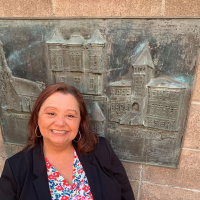
Lisa Pelletier asks Alex Stillman, Kimberley White, Edith Rosen, Dana Quillman, Chase Marcum, Humnath Panta…
Housing Equity
Arcata is a town of renters, many of whom pay half or more of their monthly income in rent. Many students and low-income folks end up homeless due to the lack of housing, especially affordable housing. What percentage of housing would you set aside for low-income housing in the Housing Strategic Plan? What about for moderate and market rate housing? Do you think that having a greater percentage of low-income housing is tied to housing equity? Why or why not?
— Lisa Pelletier
Responses

Alex Stillman
Arcata needs moderate and market rate housing to allow the opportunity for those wishing to down size to move in order to open up those homes to others to own or rent. Arcata has been doing a good job providing affordable low-income housing. A balance is needed. I think having more housing of all types leads to housing equity. We have had, historically, a housing shortage in the County. It requires all entities to step forward and the Covid Ecomonic Recovery Housing group has focused on this issue and the NIMBY factor which has stopped projects.

Kimberley White
As a planning commissioner for the City of Arcata my special interest is equitable and affordable housing. I was involved in the adoption of the City of Arcata’s updated Housing Element portion of the City of Arcata’s General Plan. The Housing Element not only included an assessment and inventory of resources in Arcata, but also looked at the regional housing needs of the county as a whole to assure we meet our share of housing needs for the entire region. The Regional Housing Needs Allocation (RHNA) numbers come from the state.
I absolutely believe having a greater percentage of low income housing is tied to housing equity. If we had a minimum of 20% set aside for low income housing it would begin to level the playing field for greater housing equity. The plight of many HSU students when they move up here to go to school is there simply isn’t enough affordable housing. Currently our housing situation is not a renters market regardless of how much one’s income is.
My top priorities are to address affordable housing including home ownership opportunities and long term solutions with dignity for the unhoused community. My particular housing interests surround solutions for safe affordable housing and the barriers that the unhoused, low income, students, veterans, seniors and the disabled face. If elected, I also want to make homeownership within reach again for our residents. I am running for city council to continue public service and pursue my passion of helping others overcome housing barriers.
As a renter or owner, you do not want to spend no more than30 percent of your monthly gross income on housing. If you’re a renter, that 30 percent needs to include utilities and renters insurance. If you are an owner, then that 30 percent needs to include homeowner costs such as homeowners insurance, property taxes, and maintenance and repairs. As you pointed out Lisa, this is not the case for Arcata renters as many are spending more than 50% of their income on housing. I suspect the same likely applies to folks looking to buy their first home in today’s housing market. This is why buying a home in Arcata is out of range for local residents.
We need to get creative on creating affordable housing opportunities. We need to ensure there is plenty of housing for all income levels. We need to look into a variety of housing options to include cooperative housing models both for rental and ownership. Arcata for whatever reason, also has never really embraced condominiums. Arcata used to have a great first time buyers program. We also had a mobile home rehabilitation program which replaced old decrepit mobile homes that otherwise would have been taken out of housing stock, with prefabricated homes. Arcata used to be cutting edge and it is time we get back to this and in particular in addressing housing equity, because everyone deserves a home.
As I shared, my passion is housing and to that end, I co-authored an Affordable and Cooperative Housing Publication in collaboration with UC Davis Center for Cooperatives. Housing is one of the reasons I became a Planning Commissioner more than three years ago. I attend a weekly CERC Housing Committee (COVID Economic Resilience Committee), I am on a housing board, and I just finished a second Cooperation Humboldt housing sprint, a 6 week sprint to identify affordable housing opportunities in our county.
Finally, I am a proponent of public banking. If the city controlled its own bank, we would decide where to invest our own money. Although this would not happen overnight, it is time we divest from fossil fuel companies and invest in solving our community’s unhoused and affordable housing crisis. Bond revenue is also a promising way for Arcata to address affordable housing. With the high percentage of renters versus homeowners in Arcata it is difficult to imagine that our citizens would not get behind a plan that would increase affordable housing over keeping homeowners property taxes low. If Arcata is serious about prioritizing affordable housing, voters must get behind higher tax rates and funding must be included in Arcata’s capital plan. Our City Council needs someone like myself with a passion and background in housing. As a current Planning Commissioner, I am ready to bring my passion, education and experience to Arcata’s City Council.

Edith Rosen
Lisa, Thank you for this insightful inquiry into housing equity in Arcata.
In the Housing Strategic Plan, it would be ideal to set aside at least 18% for low-income housing. This factors in CA State requirements for low-income housing, as well as provides additional designated amount reflecting the need in our community.
Having a greater percentage of low-income housing as a building requirement in the City absolutely has a link to housing equity. And, that is just one piece of the puzzle as we continue to work on in terms of housing equity. Barriers need to be deconstructed and replaced by additional fair and equitable programs supporting those in need.
Regarding both low and moderate income, a solid option would be to have a tiered approach to City guidelines or standards. For market rate housing, let the market determine rates.
